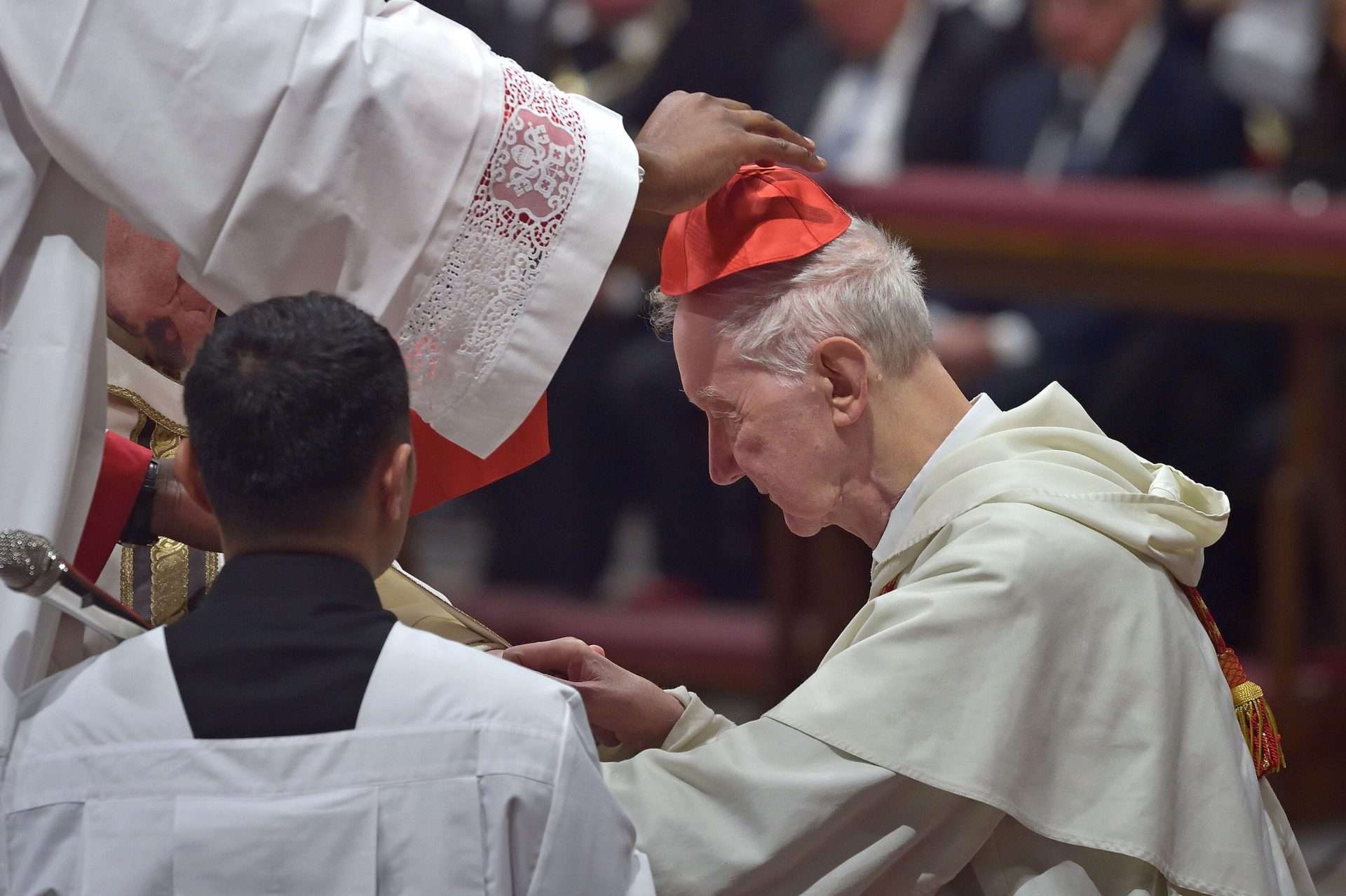Cardinal Radcliffe explains desire to renew the Church and liberate it from ‘clericalism’

dpa/Alamy Live News
Cardinal Timothy Radcliffe with Pope Francis at the Consistory for creation of new cardinals at St Peter’s earlier this month.
The cardinal was speaking at Oxford in his first public address since being given the red hat earlier this month
Britain’s new Dominican cardinal has disclosed that he came close to being denounced at the Rome Synod on Synodality because of media reporting, adding that he now believes the concept of reciprocity offers an “implicit key” to the Church’s future development.
“One of my articles for The Tablet, reprinted during the Synod without my knowledge, sparked an article in another periodical in which I was misrepresented as accusing African bishops of hypocrisy – although this was completely and totally untrue, it almost led to my formal condemnation,” said Cardinal Timothy Radcliffe.
“The Synod was seeking a life-giving mutuality in which barriers fell and we were opened up to the fertility of the Holy Spirit. But this was really difficult when many people, especially in the West, and even members of the Synod, viewed what was happening through the prism of the media, which saw it as a clash between conservatives and progressives, causes won or lost.”
The Cardinal, one of 21 installed by Pope Francis at a St Peter’s Basilica consistory on 7 December, was addressing a conference on Monday evening at his native Blackfriars Hall in Oxford, on “Synodality and the Culture of Encounter”.
He said some media commentators had played a helpful role at the three-year Synod, although most had interpreted the debates in terms of an “unfruitful polarisation of tradition and progress”.
He said, “We were trying to imagine a renewal of the Church, liberated from clericalism… But this imaginative task was made yet more difficult by the cultural context of the Vatican – it was like trying to make ice cream in the Sahara.”
Cardinal Radcliffe, a former English provincial and global Master of the Dominicans in 1992-2001, who was spiritual adviser to the Rome Synod, added: “Instead of being constrained by fixed, determined, complementary roles, as if we were jigsaw puzzles, we flourish in reciprocity… We were not just talking to each other, but discovering how to talk, reciprocally rejuvenating old words and discovering new words which opened our minds and hearts to the Kingdom.”
The one-day conference, co-organised by the Jesuit Georgetown University, was addressed by two Synod non-participants, Prague University’s Mgr Tomas Halik and Georgetown’s Jose Casanova, who faced criticism from other speakers for going too far in their advocacy of opening the Church to non-Christian faiths and ideologies.
It included a panel discussion by Synod experts: Sister Birgit Weiler from Peru’s Pontifical Catholic University, and Kim Daniels, director of Georgetown’s Initiative on Catholic Social Thought and Public Life, as well as Tricia Bruce, director of Minnesota’s Springtide Research Institute, and Professor Anna Rowlands, Durham-based chair of the Centre for Catholic Social Thought and Practice.
Professor Rowlands said she regretted the Synod’s Final Document had not discussed disability and “anthropological questions around sexuality”, as well as ideological differences in the Church and the “poor quality of relations” between theologians and bishops’ conferences.
She added, however, that she had personally read every grassroots report sent to the Synod secretariat, and was confident the three-year process had successfully built on the First and Second Vatican Councils by establishing a new “communal dimension of being the Church” which now required multiple follow-up efforts.
In his keynote address, Cardinal Radcliffe said the Synod’s “radical and exciting challenge” had lain in “embracing the plurality of cultures of our global Church” and offering new models of encounter to a multipolar “post-Western world” increasingly divided by “mutual incomprehension and increasing violence and poverty”.
He added that the Synod, like sex, could only be fully understood by those who experienced it, but said the “language of ministries” had also opened up new ways of understanding “the reciprocity of roles to be exercised by the whole people of God”, which would continue into the future.
“For synodality to succeed, we need language which is always being renewed by reciprocity,” Cardinal Radcliffe said. “Being lay or ordained are not fixed, predetermined identities, but discovered reciprocally in, with and for each other… The bishop and priest have the ministry of unity, but cannot exercise this unless their own identity is stretched open by the people of God, lay men and women.”

No comments:
Post a Comment